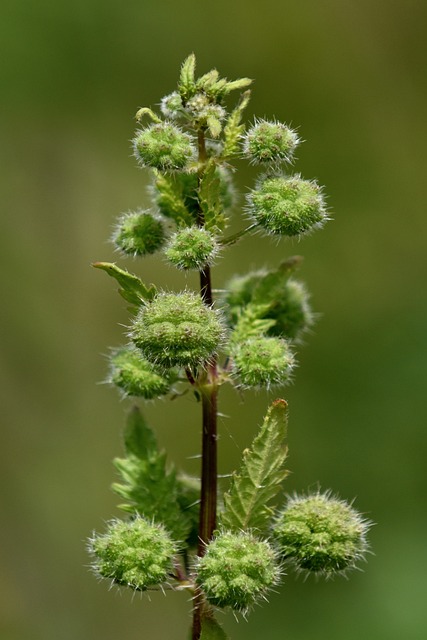This section underscores the critical role of THCA flower lab reports in the cannabis industry, providing detailed information on the cannabinoid and terpene compositions of THCA flowers. These reports are indispensable for consumers and researchers, detailing precise levels of THCA, a non-psychoactive precursor to THC, and its potential therapeutic benefits. They offer insights into the raw potency of the flower before decarboxylation, including levels of CBD, CBN, and other cannabinoids that influence the 'entourage effect' and user experience. The reports also cover soil analysis and environmental management practices crucial for cultivating high-quality THCA flowers with optimal medicinal and recreational properties. In the extraction process, precision and adherence to best practices are paramount to maintain THCA integrity and purity. Laboratory reports play a vital role in this process, ensuring the safety and efficacy of the final product by monitoring cannabinoid and terpene profiles, as well as residual solvent levels. Research into the therapeutic properties of THCA suggests it may offer analgesic, anti-inflammatory, and neuroprotective effects, potentially benefiting conditions like neuropathic pain and inflammation. However, individual responses can vary, highlighting the need for further clinical trials to fully understand its impact on health and well-being. The comprehensive data from THCA flower lab reports serve as a cornerstone for ongoing research into the full spectrum of THCA's therapeutic potential.
Explore the multifaceted world of THCA flower, a non-psychoactive cannabinoid with emerging prominence in the wellness sphere. This article delves into the potency and effects of THCA through comprehensive lab reports, offering insights into its therapeutic potential. We also explore optimal cultivation techniques for growing superior THCA flowers, ensuring each plant reaches its fullest bloom. The alchemy of extraction is unraveled with best practices tailored for processing high-quality THCA flower, preserving its natural benefits. Lastly, we examine scientific studies to understand the impact of THCA flower on well-being, providing a holistic view of this promising compound.
- Unveiling the Potency of THCA Flower: An Insightful Look at Lab Reports
- Cultivation Excellence: Optimizing Grow Conditions for Premium THCA Flowers
- The Alchemy of Extraction: Best Practices for Processing High-Quality THCA Flower
- Consumption and Effects: Understanding the Impact of THCA Flower on Well-being Through Scientific Studies
Unveiling the Potency of THCA Flower: An Insightful Look at Lab Reports

When exploring the potential benefits and effects of cannabis, THCA flower lab reports emerge as invaluable resources for both consumers and researchers. These detailed analyses provide a clear understanding of the cannabinoid profile, terpene composition, and potency of the THCA flower. THCA, or Tetrahydrocannabinolic Acid, is the non-psychoactive precursor to THC, the primary psychoactive compound in cannabis. Lab reports on THCA flowers quantify the exact levels of THCA present, offering insights into the plant’s raw potential before it undergoes decarboxylation upon heating. This quantification is crucial for those interested in utilizing the flower’s therapeutic properties without the immediate psychoactive effects associated with THC.
The lab reports delve into the intricate details of each THCA flower batch, ensuring consumers can make informed decisions based on the exact cannabinoid and terpene percentages. These analyses typically include a breakdown of cannabinoids such as CBD, CBN, and other minor cannabinoids, alongside a comprehensive profile of the terpenes present. The synergy between these compounds is often referred to as the ‘entourage effect,’ which can influence the flower’s efficacy and the experience it provides. By examining THCA flower lab reports, users gain a deeper understanding of what they can expect from their cannabis experience, enabling them to select products that align with their desired effects and wellness goals. With the growing emphasis on transparency and safety in the cannabis industry, these lab reports are becoming a standard practice, ensuring that consumers have access to reliable and accurate information about the products they choose.
Cultivation Excellence: Optimizing Grow Conditions for Premium THCA Flowers

Cultivating premium THCA flowers requires a meticulous approach to optimize grow conditions, ensuring the highest potency and quality. The terpene-rich trichomes that give THCA flowers their medicinal and recreational value are highly sensitive to environmental factors. To achieve cultivation excellence, it is imperative to maintain precise temperature and humidity levels, as fluctuations can compromise trichome production and cannabinoid profiles. Utilizing advanced climate control systems is crucial for maintaining an ideal growing environment that supports the plant’s natural growth cycle without the threat of mold or mildew, which can be detrimental to both yield and quality.
Furthermore, soil quality and nutrient delivery are pivotal in cultivating top-tier THCA flowers. A balanced, living soil rich in organic matter not only supports plant health but also enhances the complexity of flavors and aromas. Regular lab reports on soil analysis provide valuable insights into nutrient uptake and any necessary adjustments to optimize plant health and trichome formation. These analyses are instrumental in achieving a bountiful harvest with potent, high-quality THCA flowers, ensuring that each bud meets the highest standards of excellence.
The Alchemy of Extraction: Best Practices for Processing High-Quality THCA Flower

Within the specialized domain of cannabinoid processing, the extraction of THCA (Tetrahydrocannabinolic Acid) from high-quality flowers is a meticulous endeavor that hinges on precision and adherence to best practices. The alchemy involved in this process requires an intricate understanding of the plant’s chemistry, as well as a comprehensive approach to ensure the integrity and purity of the THCA. Laboratory reports play a pivotal role in this context, providing detailed analyses that guide the extraction techniques. These reports offer critical insights into the cannabinoid profile, terpene content, and residual solvent levels, which are instrumental in producing high-quality THCA extracts.
The process commences with careful selection of THCA flowers, which are then subjected to a series of precise extraction methods. These include the choice of solvents, temperature control during decarboxylation, and subsequent purification steps to remove impurities and excess plant matter. Each stage of the extraction process must be monitored closely, with real-time data informing decisions to optimize yields and maintain product safety. The goal is to preserve the natural constituents of the THCA flower, ensuring that the final product retains its therapeutic potential and desirable effects. THCA flower lab reports are indispensable tools in this process, offering a benchmark for quality control and a verification mechanism to confirm the extract’s consistency with regulatory standards and consumer expectations.
Consumption and Effects: Understanding the Impact of THCA Flower on Well-being Through Scientific Studies

Laboratory investigations into the effects of THCA flower, the raw form of tetrahydrocannabinolic acid, have yielded significant insights into its potential impact on well-being. THCA, which is non-psychoactive, has been the subject of numerous lab reports that explore its pharmacological properties and therapeutic benefits. These studies reveal that THCA interacts with the body’s endocannabinoid system, potentially offering analgesic, anti-inflammatory, and neuroprotective effects without the psychoactive consequences associated with its decarboxylated form, THC. Scientists have observed that THCA may exert a beneficial influence on conditions such as neuropathic pain, inflammation, and certain neurodegenerative diseases due to its ability to inhibit the activity of certain enzymes and receptors involved in these processes. The laboratory findings suggest that THCA flower could be a valuable component in holistic health regimens, offering relief without intoxication. However, as with any substance, individual responses can vary, and further clinical trials are necessary to fully understand its implications for well-being. The existing body of lab reports provides a foundation for this understanding, highlighting the importance of THCA flower as a subject of scientific inquiry and potential therapeutic agent.
In conclusion, the exploration into THCA flower has illuminated its potential, substantiated by thorough lab reports and supported by the meticulous cultivation and processing methods employed by experts in the field. The collective insights from these domains underscore the importance of understanding both the scientific backing and the practical approaches that lead to the creation of high-quality THCA flowers. As this article has outlined, from the optimized grow conditions to the alchemy of extraction, each step is critical in delivering a product that offers a range of benefits as evidenced by scientific studies on its consumption and effects. For those interested in exploring the benefits of THCA flower, it is clear that informed choices and attention to quality are paramount. With ongoing research and advancements in cultivation and processing techniques, THCA flower lab reports will continue to provide valuable data, ensuring users have access to accurate and reliable information for informed decision-making.


